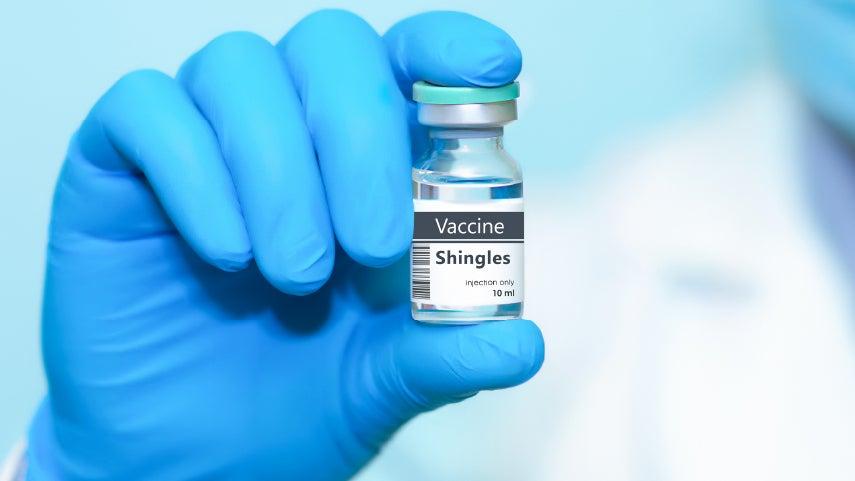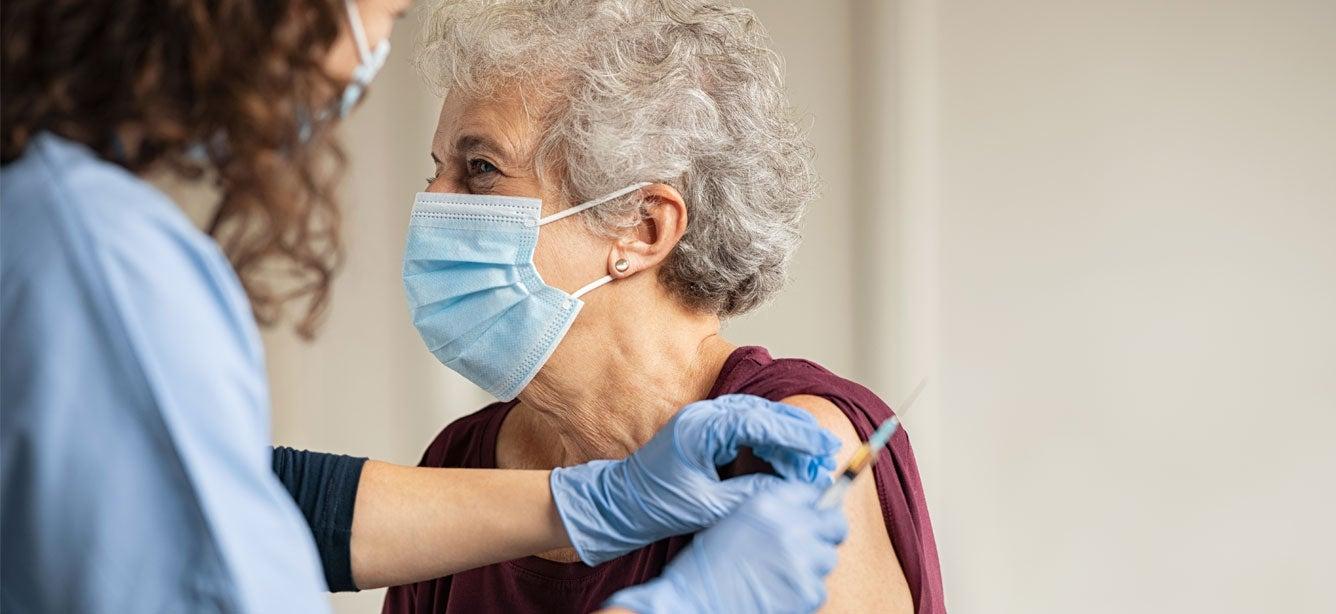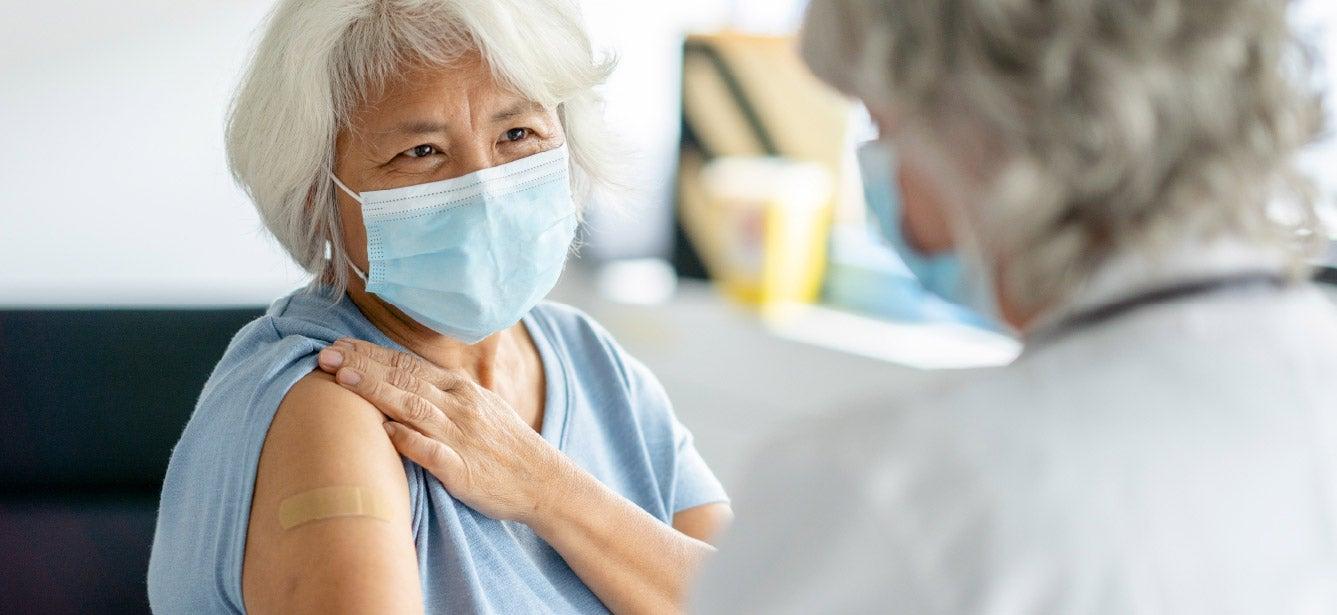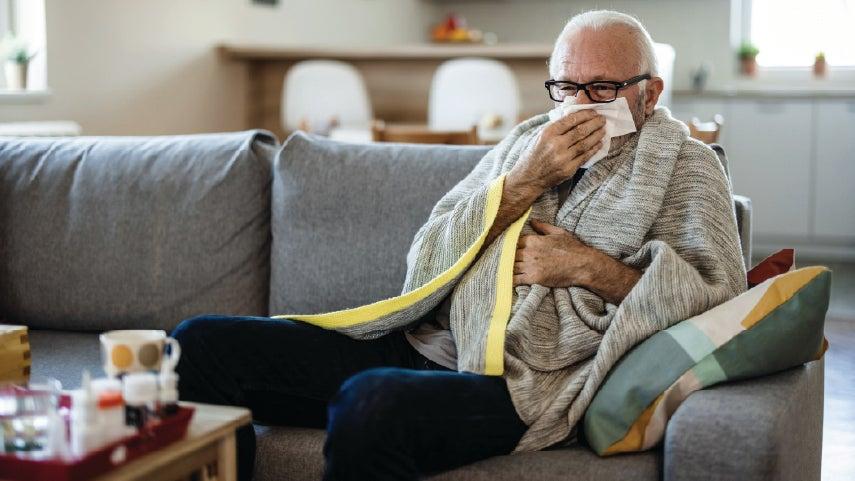How Long Does the Shingles Vaccine Last?
7 min read

Related Topics
Are you nearing (or over) age 50? If so, chances are you’ve heard about the shingles vaccine. You might be trying to decide if it’s worth getting—and wondering how long protection from the shot lasts. Understanding more about the vaccine’s effectiveness and its benefits can help you make an informed decision about your health in partnership with your health care provider.
What is shingles?
Shingles (herpes zoster) is a painful, blistery rash that develops when the varicella-zoster virus—the same virus that causes chickenpox—reactivates in your body. If you’ve had chickenpox, the virus stays dormant in your nerve tissue and can reactivate later in life, causing a shingles episode. The infamous shingles rash often resembles a single stripe of blisters that often wraps around the left or right side of the torso. Shingles can affect other parts of the body, including the head and face.
Is shingles dangerous? Beyond causing an uncomfortable skin rash, this illness can lead to complications such as postherpetic neuralgia (PHN). PHN is a condition characterized by severe nerve pain that lasts even after the shingles rash has fully healed. Shingles in the eye can cause burning pain, redness, and sensitivity to light. In some cases, it can lead to vision impairment, including blindness, if left untreated.
Shingrix—the only U.S. vaccine that protects against shingles
Now that we’ve covered the basics, you might be wondering: Is there a shingles vaccine? Yes, there is a vaccine available to help prevent shingles and decrease the severity of symptoms if you do get it. The only shingles vaccine used today is Shingrix, approved in 2017 by the U.S. Food and Drug Administration (FDA). It works by boosting your body’s natural immunity, reducing the chances of the varicella-zoster virus reactivating and causing the shingles rash.
In terms of effectiveness, Shingrix is considered a significant improvement over the older Zostavax vaccine. Zostavax is no longer available in the U.S. after being discontinued in 2020.
At what age is the shingles vaccine given?
For healthy adults age 50+, the Centers for Disease Control and Prevention (CDC) recommends two doses of Shingrix separated by two to six months.
Vaccination is also recommended for some adults age 19 and older who have weakened immune systems. People who are immunocompromised can receive their second dose of Shingrix one to two months after the first dose.
Some things to keep in mind when considering Shingrix:
- You don’t need to show a history of chickenpox to get the vaccine. That’s because many older adults who had chickenpox in childhood may not remember having it.
- You should get the two-dose shingles vaccine even if you were previously vaccinated with Zostavax.
- What if you’ve already had shingles? Even if you’ve suffered an episode previously, you can still benefit from getting vaccinated since you can get shingles more than once.
What is the success rate of Shingrix?
Shingrix is highly effective, with protection lasting for several years. According to research reported by CDC, this two-dose shingles vaccine was 97% effective in preventing shingles in adults age 50 to 69 with healthy immune systems. In people age 70 and older, the vaccine was 91% effective.1 In adults with weakened immune systems, Shingrix was 68% to 91% effective in preventing shingles, depending on underlying medical conditions.1
Zostavax, on the other hand, provided strong effectiveness against shingles in the first year (67%), but dropped to just 50% efficacy the second year.2
How many years does the Shingrix shot last?
While Shingrix is highly effective, its protection may not last for your entire life. Immunity from the shingles vaccine series lessens over time, but it does so very gradually. Studies have shown that among people age 70 and older, Shingrix provides at least 85% protection against shingles for up to four years after completing the two-dose series,3 and remains high for at least seven years.3
Newer research offers even better news: Researchers followed clinical trial participants for several years after initial vaccination with Shingrix. They found tthat this shingles had nearly 80% efficacy in participants age 50 and older up to 11 years after vaccination.4
It’s important to remember there are a variety of factors that affect vaccine efficacy for each person, such as age and overall health. “All vaccines are most effective just after they have been given,” Linda Yancey, MD, an infectious disease specialist at Memorial Hermann Health System in Houston, told Verywell Health.
There is no one answer to the question of how long a vaccine is effective. It is going to vary from person to person,” Yancey said.
Do you need a booster for Shingrix?
How often do you need to repeat the shingles vaccine series? Until further research suggests otherwise, older adults generally only need to get the two-dose shingles vaccine once. No Shingrix vaccine booster is currently available. Recommendations and the availability of boosters could change as scientists learn more about how long protection from the shingles vaccine lasts.
Why is the shingles vaccine important for older adults?
For older adults, the two-dose shingles vaccine provides several critical benefits in addition to lasting protection:
- Prevents a painful condition: The shingles rash can cause severe discomfort, with symptoms ranging from itching and burning to intense pain. This pain can last for months or even years, especially in cases of PHN, which is caused by damage to nerve fibers during an active shingles infection. PHN affects roughly 10% to 18% of people who have shingles.5 Shingles pain often requires the use of over-the-counter or prescription pain relievers, which can be a concern for some older adults with other health conditions, leading to drug interactions and side effects. Also, pain can impact our ability to carry out daily activities and impact our quality of life.
- Decreases the chances of shingles spreading: Is shingles contagious? While the illness itself is not contagious in the same way a cold or the flu is, the virus that causes shingles is transmissible. Someone with shingles can spread the virus that causes shingles to someone who has never had chickenpox or has never vaccinated against chickenpox. Getting the two-dose vaccine is your best strategy for shingles prevention.
- Reduces the risk of other complications: In addition to long-term nerve pain from PHN, complications from shingles can include skin scarring and vision problems (if the shingles rash occurs near the eyes). Shingles can also lead to serious infections in rare cases, which may require hospitalization.
- May help prevent dementia: In a 2024 study, UK researchers analyzed the electronic health records of more than 200,000 older Americans. They found that people who received the Shingrix shingles vaccine series were 17% less likely to develop dementia compared to people who received Zostavax (discontinued in 2020).6 These exciting findings suggest that shingles vaccine components may hold promise for preventing devastating cognitive decline.
- May help prevent heart attack and stroke: Here's another great reason to get your shingles vaccine: A recent study linked shingles vaccination with a "statistically significant lower risk of heart attack and stroke." Adults who received the two-dose shingles vaccine had a lower risk of stroke and heart attack compared to those who didn’t. The vaccine reduced cardiovascular events by about 18% in adults age 18-49 and 16% in adults age 50 and older.7
The benefits of the two-dose shingles vaccine far outweigh the minimal risks for older adults. Plus, unlike an annual flu or COVID vaccine, a two-dose Shingrix shot offers solid protection that can last a good decade or more.
Will I have a reaction to the shingles vaccine?
FDA-approved Shingrix is well-tested and shown to be safe, with few side effects reported. Common shingles shot reactions may include soreness at the injection site, fatigue, or mild flu-like symptoms for a day or two after vaccination. These side effects usually go away in a couple of days, says healthy aging expert Dorothea Vafiadis.
“Shingles can be incredibly painful and even lead to long-term complications that disrupt daily life,” said Dorothea Vafiadis, Senior Director of NCOA’s Center for Healthy Aging. “A brief moment of discomfort from a vaccine is a small price to pay for the peace of mind and protection it provides as we age.”
Where can I get the shingles vaccine?
The two-dose shingles vaccine is widely available in doctor's offices and pharmacies. To find a shingles vaccine provider near you and schedule an appointment, use this shingles vaccine locator tool.
Good news: Shingrix is 100% covered if you have Medicare (Part D) or Medicaid, since it’s recommended for older adults by the Advisory Committee on Immunization Practices (ACIP). This means you won't pay a copayment or apply a deductible. The shingles vaccine series is covered by most private insurance plans as well.
Sources
1. Centers For Disease Control and Prevention (CDC). Shingles (Herpes Zoster) - Shingles Vaccination. Found on the internet at https://www.cdc.gov/shingles/vaccines/index.html
2. Kaiser Permanente Division of Research. Study confirms significant waning of original shingles vaccine over 10 years. November 8, 2023. Found on the internet at https://divisionofresearch.kaiserpermanente.org/blog/2023/11/08/waning-original-shingles-vaccine/
3. Immunize.org. Ask the Experts - Zoster (Shingles). Found on the internet at https://www.immunize.org/ask-experts/topic/zoster/
4. GSK. New long-term data show Shingrix continues to provide high protection against shingles in adults aged 50 and over for more than a decade. April 17, 2024. Found on the internet at https://www.gsk.com/en-gb/media/press-releases/new-long-term-data-show-shingrix-continues-to-provide-high-protection-against-shingles-in-adults-aged-50-and-over-for-more-than-a-decade/
5. Centers For Disease Control and Prevention (CDC). Shingles (Herpes Zoster) - Shingles Symptoms and Complications. Found on the internet at https://www.cdc.gov/shingles/vaccines/index.html
6. Maxime Taquet, et al. The recombinant shingles vaccine is associated with lower risk of dementia. Nature Medicine. July 25, 2024. Found on the internet at https://www.nature.com/articles/s41591-024-03201-5
7. University of Minnesota CIDRAP. Shingles vaccine linked to lower heart attack, stroke risk. August 28, 2025. Found on the internet at https://www.cidrap.umn.edu/misc-emerging-topics/shingles-vaccine-linked-lower-heart-attack-stroke-risk




